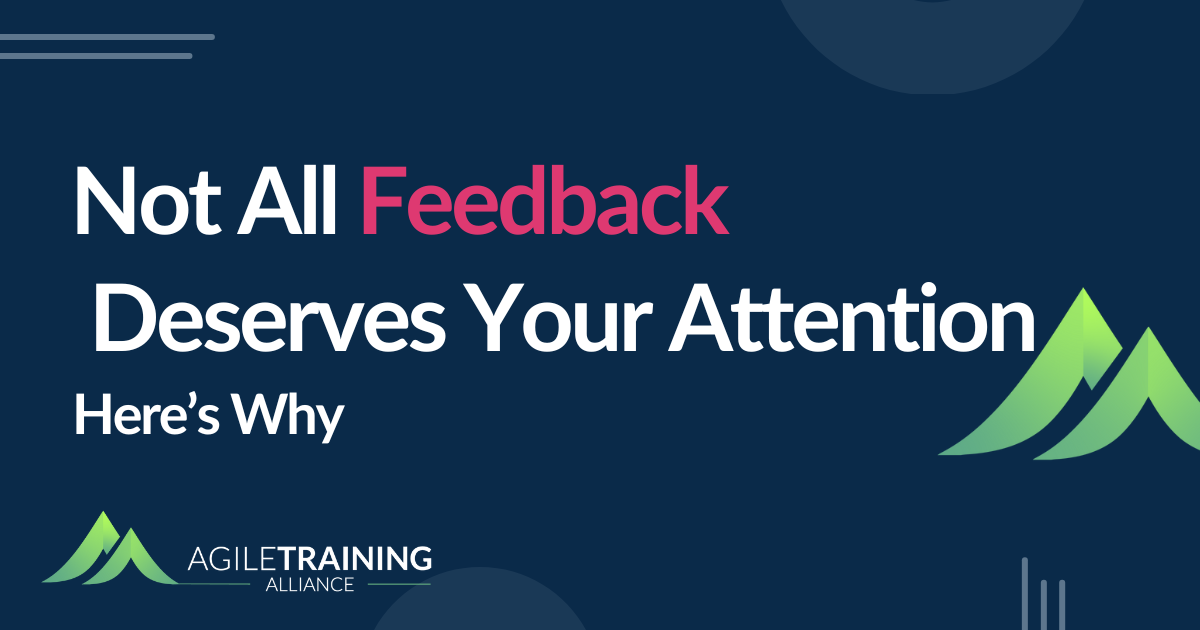Is it okay to say no to feedback? But wait, isn’t feedback a cornerstone of being agile? Aren’t we supposed to embrace it with open arms?
For years, I believed that feedback was a gift I couldn’t afford to reject. I sought it out relentlessly – from my manager, colleagues, students, mentees, and anyone willing to offer it. Feedback became synonymous with growth in my mind. After all, I was agile, and showing openness to feedback was a badge of honor, a way to lead by example.
But here’s the truth no one talks about: feedback can be overwhelming. It can make you question yourself, push you toward burnout, and, if unchecked, drive you insane.
A few years ago, I gave a talk titled “Is Agile Driving You Insane?” It was a deeply personal reflection on how my obsession with feedback turned into a toxic cycle of perpetual self-improvement. When was it enough? When could I finally stop striving and just be myself?
Through years of self-reflection, I’ve learned that it’s okay to say no to feedback. Being agile doesn’t mean you have to accept every piece of input that comes your way. The magic lies in discerning when feedback is valuable and when it’s okay to decline.
Here are four powerful questions I now ask myself before I seek or accept feedback:
1. Am I in the right mindset to receive feedback?
Years ago, I co-trained with a mentor I greatly admired. After the session, I eagerly awaited his feedback. But instead of offering any, he said:
“I’m not going to give you feedback. You’re hard enough on yourself, and you already know what to improve.”
At first, I felt disappointed. But with time, I realized how profound his words were. Had I received feedback at that moment, I would’ve used it as ammunition to punish myself for not being “good enough.”
Before seeking feedback, I now check in with myself:
-
- Am I ready to accept feedback constructively?
- Or will it weigh me down unnecessarily?
2. Do I respect the person giving the feedback?
Not all feedback is created equal. Early in my career, I sometimes took feedback from people whose values or methods didn’t align with mine. This often led to self-doubt and confusion.
Now, I ask myself:
-
- Do I share values and respect their expertise?
- If not, is their feedback truly useful – or will it cause unnecessary internal conflict?
3. Have they walked in my shoes?
Some people love giving advice, but feedback without lived experience can miss the mark. After becoming a parent, this lesson became crystal clear. If someone hasn’t been in the same scenario or faced similar challenges, their feedback might lack context and relevance.
Before accepting feedback, I ask:
-
- Do they have firsthand experience?
- Can they truly understand my situation?
4. Is my “feedback cup” already full?
Feedback is only valuable if we have the capacity to act on it. Sometimes, we simply have too much on our plates. If our backlog of feedback is overflowing, it’s better to pause and focus on what’s already there rather than adding more.
Conclusion: It’s Okay to Say No to Feedback
Feedback is a powerful tool – but only when used intentionally. It’s okay to decline feedback or decide not to ask for it. Being agile isn’t about saying “yes” to everything – it’s about being mindful of what truly serves your growth and well-being.
The next time you’re faced with feedback, ask yourself: Is this the right time, the right person, and the right input? If not, it’s perfectly okay to say no.





